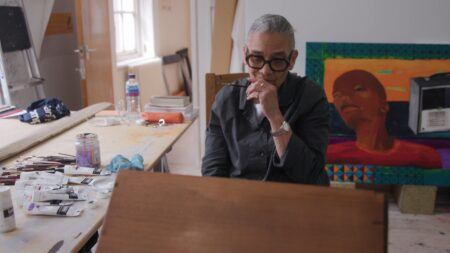Mimi Ọnụọha

Mimi Ọnụọha was born in 1989 in Parma, Italy and currently lives and works in Brooklyn, NY. Ọnụọha earned her B.A. in anthropology from Princeton University and later her MPS from NYU’s Interactive Telecommunications Program. Through her multimedia and archive-based practice encompassing code, installation, video, and performance, the artist investigates the power dynamics inherent in data collection and technology and how data shapes and limits our understanding of the world. Her work often highlights patterns of absence or “blank spots” that emerge from reducing complexities to finite data sets, drawing attention to the biases embedded in the data collection processes.
Throughout her practice, Ọnụọha challenges the neutrality and objectivity of data and technology, revealing their biases and resulting impacts on our understanding of the world. The artist’s project The Library of Missing Data Sets (2015-2022) gives physical representation to datasets that have been excluded from the public domain or are nonexistent altogether. To represent these missing datasets, Ọnụọha displays filing cabinets full of empty folders with labels like “publicly available gun trace data” or “people excluded from public housing because of criminal records,” inviting viewers to sift through the absent data. Calling attention to missing datasets, the artist highlights how data collection and dissemination perpetuates systemic harms and the consolidation of authority. “In any system, there’s always a kind of hierarchy of what is perceived to be important,” the artist says. “What isn’t seen or what isn’t meant to be seen just tells you something about what is prioritized.” In the series of works Us, Aggregated (2017-2019), the artist examines how algorithmic groupings can flatten or erase nuances of identity. Reverse image searching personal family photos on Google, Ọnụọha displays collections of related images provided by Google in different forms, including a website, a photo installation, and a video, underlining how individuals are perceived and categorized by ubiquitous algorithms. Through both works, the artist explores how technologies are used to understand and organize our world, challenging the limitations of data and algorithms to analyze and encompass human experience.
In addition to looking beyond the surface of data and algorithmic technologies, Onouha also uses sculpture and a more physical approach as a means to examine and humanize digital infrastructures. In The Cloth in the Cable (2022), the artist wraps cables with materials like hair, cloth, dust, spices, herbs, and significant cultural items from her Igbo heritage, making these networks tactile and tangible while also imbuing the veins in which information flows with cultural values, histories, and alternative ontologies. In the looped film These Networks Are Our Skin (2021), Ọnụọha draws from multiple tenets of traditional Igbo cosmology: four women deconstruct cables and fuse them with organic materials to form a new creation myth for the origins of technology. Whether through highlighting what’s missing, exposing algorithmic biases, or physical interventions in digital infrastructure, Ọnụọha’s work and her critiques of the politics of data function as a strategy of resistance and a space for viewers to critically examine how data and its interconnected systems shape our world.
Videos 1
-
Morehshin Allahyari, American Artist, and Mimi Ọnụọha
“In any system, there’s always a kind of hierarchy of what is perceived to be important. Something has to be absent. What isn’t seen or what isn’t meant to be seen just tells you something about what is prioritized.”
Mimi Ọnụọha

